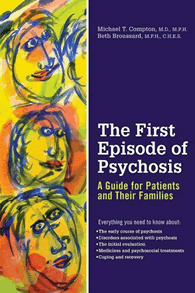News Release: School of Medicine
Jul. 31, 2009
News Tip: Book Helps Patients and Families Navigate Early Psychosis
 Written with an optimistic tone and recovery-oriented focus, The First Episode of Psychosis is intended to be a general resource informed by standard-of-care guidelines from the International Early Psychosis Association (IEPA) and the American Psychiatric Association (APA).
Written with an optimistic tone and recovery-oriented focus, The First Episode of Psychosis is intended to be a general resource informed by standard-of-care guidelines from the International Early Psychosis Association (IEPA) and the American Psychiatric Association (APA).For some, psychosis begins with hearing voices, or possibly delusional or paranoid beliefs, and yet for others it could be disorganized thinking. These symptoms may be accompanied by unusual or bizarre behavior, trouble with social interactions and difficulty with everyday activities.
Psychosis, a loss of touch with reality due to hallucinations or delusions, is a condition that affects about 3 percent of the population over the course a lifetime. Despite advances in the field of mental health, many patients experiencing the onset or first episode of psychosis, which often occurs during late adolescence or early adulthood, feel lost and bewildered in the dizzying complexity of diagnosis and treatment.
A new book on the topic of psychosis addresses the concerns experienced by patients and families as they come to grips with the diagnosis. Written by Michael T. Compton, MD, MPH, assistant professor in the Department of Psychiatry and Behavioral Sciences, Emory School of Medicine, and Beth Broussard, MPH, CHES, a research staff member in the same department, The First Episode of Psychosis: A Guide for Patients and Their Families offers help by outlining a clear guide for patients experiencing the often frightening and confusing initial episode of psychosis. Both Compton and Broussard provide mental health care at Grady Memorial Hospital.
The book is particularly useful for family members, the authors say.
"Many patients, especially younger ones, have many questions," says Compton. "This book covers a range of disorders, focusing on primary psychotic disorders such as schizophrenia and schizophreniform disorder. It clearly describes symptoms, early warning signs, and treatment options.
Broussard says, "It's essentially the first book on this topic for patients and their families who have been searching for answers. It's meant to be a complete resource, offering everything they need to know to help empower without overburdening."
Drawing on clinical expertise, health education/mental health literacy principles, studies conducted by The ACES Project (Atlanta Cohort on the Early course of Schizophrenia) and collaboration with more than a dozen international experts, Compton and Broussard discuss psychiatric evaluation, healthy lifestyle choices and the stigma often associated with mental illnesses.
Worksheets in The First Episode of Psychosis allow readers to keep records of symptoms in order to facilitate communication with mental health care providers. A glossary is included to explain the often-confusing medical terms and help bolster patients' understanding.
"The hope is that readers can carry this compact book to appointments to encourage discussion between patient and provider," says Broussard.
Written with an optimistic tone and recovery-oriented focus, The First Episode of Psychosis is intended to be a general resource informed by standard-of-care guidelines from the International Early Psychosis Association (IEPA) and the American Psychiatric Association (APA).
Compton and Broussard have received a grant to purchase nearly 400 copies of the book to provide it free-of-cost to patients experiencing a first episode of psychosis and their family members at Grady Memorial Hospital.
"Patients, families and health care providers need to team up as much as they can early on. We've tried to compile this material to be used as a resource so if patients and their families learn a lot about their illness early on, the path to recovery or adaption to illness will be better and patients will ultimately have better outcomes," says Compton.
Reference:
The First Episode of Psychosis: A Guide for Patients and Their Families. Compton, Michael T. M.D., M.P.H. and Broussard, Beth M.P.H., C.H.E.S.
###
The Robert W. Woodruff Health Sciences Center of Emory University is an academic health science and service center focused on missions of teaching, research, health care and public service. Its components include schools of medicine, nursing, and public health; Yerkes National Primate Research Center; the Emory Winship Cancer Institute; and Emory Healthcare, the largest, most comprehensive health system in Georgia. The Woodruff Health Sciences Center has a $2.3 billion budget, 17,000 employees, 2,300 full-time and 1,900 affiliated faculty, 4,300 students and trainees, and a $4.9 billion economic impact on metro Atlanta.
Learn more about Emory’s health sciences:
Blog: http://emoryhealthblog.com
Twitter: @emoryhealthsci
Web: http://emoryhealthsciences.org
